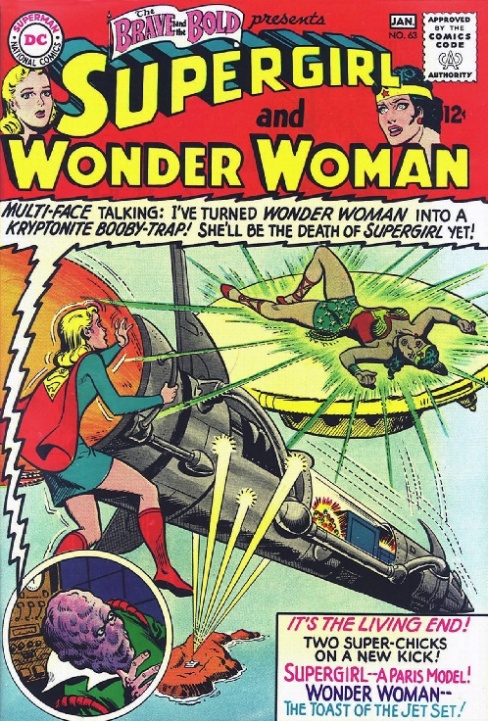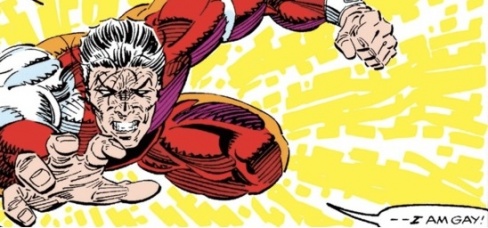There’s no better way to start a new year than to reflect on previous ones, and Multiversity’s history column is here to help you out! In today’s article, you’ll read about the first science fiction comic and the first superheroine team-up. Plus – read about public and private responses to the sexual revelations by X-Men member Northstar.

Pulp magazine publisher Fiction House entered the comic book business in September 1938 at the urging of the Eisner-Iger packaging studio and had an immediate hit with “Jumbo Comics” and Sheena, Queen of the Jungle. A little over a year later in January 1940, Fiction House expanded its line with “Jungle Comics”, “Fight Comics”, and “Planet Comics”.
The last one, “Planet Comics”, is what interests us today since it was the first science fiction comic book. It was designed to be a companion title to Fiction House’s new pulp magazine “Planet Stories” and, like other works from the publisher, featured lots of barely-dressed women. The first issue in the anthology series contained seven stories across 64 pages, and all but one involved adventures on (or getting to) another planet.
The concept wasn’t revolutionary by any means – the second science fiction comic was “Science Comics” released the next month by Fox Feature Syndicate. (I’m sure the third one followed soon thereafter, but history rarely cares about third place.) In addition to its inventive stories, “Planet” was one of the infamous “headlight comics” popular among boys for the titillating focus on almost-revealed breasts. Ironically, a significant amount of the artwork was drawn by women using masculine pseudonyms.
“Planet Comics” ran a very respectable 73 issues through late 1953, coming to an end just a little before its sister publication “Planet Stories” and Fiction House itself. The series has been reprinted in 14 beautiful slipcase editions from PS Publishing.

With issue 50 in November 1963, “Brave and the Bold” changed from a “Showcase”-style anthology to a team-up book. Before Batman became a permanent part of the team up about two years later, readers were treated to a bi-monthly dose of fun such as The Metal Men and Atom, or Flash and Doom Patrol. Mixed in with the other out-of-a-hat combinations was this unheralded gem in issue 63, cover dated January 1966.
What’s so special about Supergirl and Wonder Woman, you ask? Is it the horribly dated story inside called ‘The Revolt of the Super-Chicks’, where the two heroines quit the super business to enjoy a life of leisure with their new beautiful boyfriends? No, although that Bob Haney-written piece certainly is a conversation starter.
No, what makes “Brave and the Bold” #63 momentous is the pairing of the heroines. That is, the pairing of them without including a hero. This is the first superheroine team up, an event which seems unusually insignificant. Major firsts appearing in random numbered issues is nothing special – see “All-Star Comics” #3, “Detective Comics” #27, or “Amazing Fantasy” #15 – but this one isn’t marked by many collectors as a desirable key. The latest edition of “Overstreet” notes the characters but not the achievement, with the value listed being right in line with the surrounding ones. This may just be an oversight, however, as both Lone Star Comics and Mile High Comics show it with a higher price than surrounding issues.

When John Bryne began developing the Alpha Flight characters for the debut of their self-titled 1983 comic series, he decided one of the heroes would be gay as a way of adding some depth and reflecting the real world. However, policies in place at Marvel at the time prevented him from saying this outright and he (and later writers) were limited to hints and clues for almost eight years.
Then came the big day – January 14, 1992 – when “Alpha Flight” #106 hit the stands. Writer Scott Lobdell worked with editor Christian Cooper to say it plainly.

As Marvel’s first openly gay superhero, the issue received national media coverage, nearly all of it positive (see this example). There was a less public response however, and it wasn’t as nice. Among other things, a major retail chain threatened to pull all X-Men toys from the shelves despite Northstar not being part of the toyline.
Management told editors to avoid storylines that could stir controversy, and its impact was felt by Peter David twice. First, his story about mutant abortions in “X-Factor” was rewritten so that it was incomprehensible. Later, in “Incredible Hulk”, he was forced to delay revealing the supporting character Hector was also gay. Once again, Marvel had limited him to hints and clues.
Did you enjoy this article? Check out the Ghost archives!






